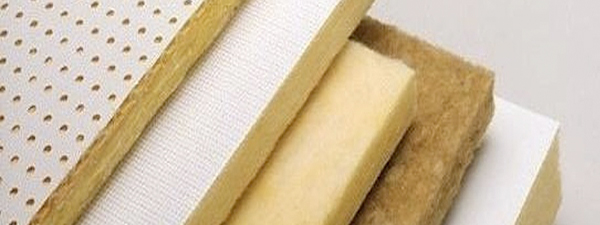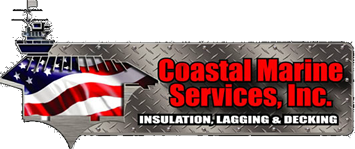
INSULATION & LAGGING
Insulation & Lagging(Marine Insulation)
The Mechanical Insulation Design Guide's definition of mechanical insulation:
MECHANICAL INSULATION is defined to encompass all thermal, acoustical, and personnel safety requirements in:
a. Mechanical piping and equipment, hot and cold applications
b. Heating, Ventilating, and Air Conditioning (HVAC) applications
c. Refrigeration and other low-temperature piping and equipment applications
CMSI and our years of excellent workmanship and customer service have been used to insulate equipment, systems, processes, structures, as well as numerous other specially contracted projects.Structural[Bulkhead and Overhead(Hull Insulation) onboard US Naval Ships is a specialized Industry skill that CMSI has been performing for over two decades]. With quality and efficiency the work has spoke for itself making CMSI a prominent presence for both East and West Coast Ship Repair. Structural[Bulkhead and Overhead(Hull Insulation) onboard US Naval Ships is a specialized Industry skill that CMSI has been performing for over two decades].
Insulation is manufactured from a variety of materials, including cellular, fibrous, flake, granular, and reflective. Insulation is used on both high- and low-temperature applications and serves a number of functions, including protecting workers from burns on hot surfaces, lessening noise on air-handling systems (for occupant productivity and comfort in offices, for example), and maintaining the temperature of a substance in pipes or equipment to prevent more energy being used to re-heat or re-cool it when it reaches its destination.
Insulating piping and equipment in commercial, institutional, and industrial facilities with fiberglass, rock-wool, and slag-wool insulation systems is perhaps the easiest and most cost-effective way to conserve energy, save money, and preserve the environment.
These insulation products reduce heat loss or gain, protect personnel, provide process control, reduce condensation, protect against corrosion and fire, and abate noise and vibration. Fiber-glass, rock-wool, slag-wool pipe, blanket, and equipment insulations are used in a variety of commercial and industrial applications in, not only Ship Repair, but office buildings, power plants, chemical plants, petroleum refineries, steel, pulp, paper mills, and food process plants, to name a few.
A properly designed, specified, installed, and maintained insulation system is an investment with rapid returns, with paybacks in often less than a year.
Benefits of Mechanical Insulation:
Reduce Heat Loss, Reduce energy prices
Fire Protection and Protection against hot pipes
Prevent Condensation and pipes from freezing
Protection from corrosion
Sound Reduction and Acoustic Protection
Types of Mechanical Pipe Insulation |
 Fiberglass Pipe Insulation Fiberglass Pipe Insulation - Made from inorganic glass fibers and a foil vapor retarder ASJ jacket, this product offers excellent resistance to heat loss and gain with a thermal conductivity (.23 K at 75 degress F). The inorganic fibers of Fiberglass pipe insulation give the product excellent fire resistance and can be applied to applications with an operating temperature up to 1000 degrees Fahrenheit. Common uses include commercial building, industrial and process applications.
Click here for more info on fiberglass insulation products.
|
 Elastomeric Rubber Pipe Insulation Elastomeric Rubber Pipe Insulation – Also known as Closed Cell Pipe Insulation, is thermal insulation designed for the HVAC and Refrigeration industry. Rubber foam insulation's closed-cell foam technology is highly recommended for condensation control, due to its excellent moisture vapor resistance (<0.06) and thermal conducticty (.265 K at 75 degree F). Applications include refrigerant lines, cold water plumbing, chilled water systems, and can also be used to retard heat flow on solar panels and other applications up to 220 degrees Fahrenheit. It is a very flexible product that makes it easy to apply. A main supplier of rubber insulation products is K-Flex USA which was formerly known as Nomaco.
Click here for more info on rubber foam insulation products
|
|
|

Calcium Silicate Pipe Insulation – Used for high temperature pipe and equipment in industrial applications such as petrochemical and power generation because of its low thermal conductivity, durability, compressive strength and corrosion inhibiting properties. Calcium Silicate is ideal for operating temperatures up to 1200°F (649°C). The product will not burn and is used for fire protection in some applications as well.
Manufactured by IIG under the product name Thermo-12 Gold.
for more information on Calcium Silicate Pipe Insulation, view manufacturers website: www.iig-llc.com |
|
|
Marine Fiberglass Hull Insulation

APPLICATIONS
- Shipboard hulls, bulkheads, overheads, stiffeners, beams, and ductwork requiring thermal protection.
- Bulkheads, stiffeners, and beams that require treatment for fire impingement.
- Shipboard applications requiring USCG fire ratings per USCG No. 164.00
STANDARD TYPES
- N3A—Plain fiberglass marine hullboard, per MIL-I-742, Ty. II
- NC3A—N3A hullboard faced with fiberglass cloth per MIL-C-20079, Ty. I, Cl. 2. Finished product meets MIL-I-742, Ty. I.
- N3A-F (Foil)—N3A hullboard with a 2-mil aluminum foil facing
- NC3A-GRVD (Grooved)—N3A hullboard, grooved/slotted and faced with perforated fiberglass cloth per MIL-C-20079, Ty. I, Cl. 2
- NC3A-P—N3A hullboard laminated to high-density waffle board, faced with perforated fiberglass cloth per MIL-C-20079, Ty. I, Cl. 2. Finished product meets MIL-A-23054.
- Tuffskin 1613—Fiberglass board faced with fiberglass scrim reinforced mylar. Finished product meets MIL-I-22023, Ty. III.
- Low-K 400 and Low-K 600 - 4lb and 6lb density mineral wool approved for USCG applications. Available plain, cloth faced, mylar faced or laminated to high density waffle board.
FOR PCMS TILE REQUESTS, CALL: (619)291-8176
DECK COVERING
INFORMATION COMING SOON
 LOCATIONS
LOCATIONS LOCATIONS
LOCATIONS
